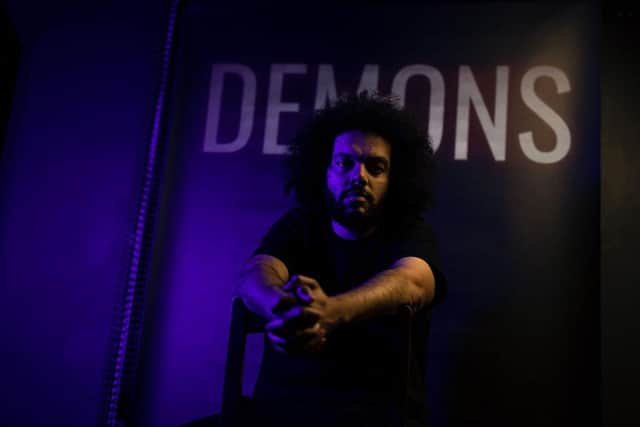Album reviews: U2 | Steg G | brownbear


U2: Songs of Surrender (Island Records) ****
Steg G: Demons (self-released) ****
brownbear: Demons (Braunber Records) ***
If you’ve ever wondered what rock superstars got up to in lockdown, here is one answer. Irish legends U2 re-interpreted songs from across their catalogue to create the studio equivalent of one very long acoustic interlude in their stadium shows.
Songs of Surrender was inspired by frontman Bono’s memoir Surrender: 40 Songs, One Story. These 40 songs are arranged in albums of ten, each named after a different band member, though this was primarily guitarist The Edge’s project, entered into with agreement that he had a license to mess with the original songs, changing chords and keys as well as finessing new arrangements.
Advertisement
Hide AdAdvertisement
Hide AdThe tracklisting traverses widely across their career from early single Eleven O’Clock Tick Tock to their most recent studio album, 2017’s Songs of Experience, from their most recognisable anthems to bonus tracks on later albums. The results are something of a leveller, providing the opportunity to consider newer material which has made less of a splash alongside the songs on which they built their reputation.
Some have already been heard on Bono’s Stories of Surrender tour. Track one is One, Track 40 is 40 – the former a masterpiece in a mighty discography, given a slow, sombre piano interpretation with Bono dialling down his belter tendencies as much as he can, the latter a soft, breathy prayer rather than a howl of anguish.


Conversely, Where The Streets Have No Name becomes a little too morose but Beautiful Day works as a quieter plea to appreciate the moment. These are tonal shifts rather than total transformations. A decidedly non-pomp Pride (In The Name of Love) builds with guitar solo and overlapping vocals, but fades out with just a hint of the chanted coda.
City of Blinding Lights retains its signature chiming hook and Who’s Gonna Ride Your Wild Horses is given a straightforward acoustic makeover. A gruff, moody, semi-spoken I Still Haven’t Found What I’m Looking For is delivered in a lower key while Desire is sung in a spindly falsetto with plenty space in the backing track.
All I Want Is You becomes a tender raga and The Fly contrasts prowling verses with ethereal choruses. Honouring the original’s reputation as a sonic watershed for the band, the guitars here sound more like sitars. Elsewhere, Bono sings over a bowed cello on Dirty Day (from Zooropa). But experimentation gives way to spirit on The Miracle (of Joey Ramone), a relatively raucous shoutalong in celebration of “the greatest voice I ever heard”.
The final album (“Bono”) makes a late bid for representation of some early favourites including a bare but passionate Sunday Bloody Sunday and a fuller treatment of Two Hearts Beat As One which maintains the urgency of the original like an old friend who hasn’t lost their spark.


Like delayed buses, two albums titled Demons arrive in the same week from Scottish artists. Veteran Glasgow rapper Steg G, aka Steven Guilfoyle, samples Gerry Cinnamon singing “I got plenty of demons under my bed” for his exploration of mental health. Collaborating again with Govan community orchestra the Glasgow Barons and guest rappers Freestyle Master, Empress and Solareye, he builds an atmospheric backdrop of sonorous chimes, soulful saxophone, propulsive rock basslines, metallic guitar and B-movie samples to soundtrack his internal tussles and relationship regrets.
Advertisement
Hide AdAdvertisement
Hide AdThe second album by brownbear, aka Ayrshire songwriter Matt Hickman, is a breezier indie proposition, referencing stomping rhythm’n’blues (Take Your Time), Mumfords-like indie folk (Let Your Guard Down) and piano pop balladry (Spin Another Web). The album is frontloaded with catchy tunes, but mellows out with the bruised vocals of Little White Lies before ending on pop gospel highlight Unity.
CLASSICAL
Byrd: A Watchful Gaze (Coro) ****
The latest in The Sixteen’s series celebrating the preeminent Renaissance composer William Byrd’s 400th anniversary focuses on context. Besides music by Byrd himself – motets mostly reflecting the prevailing inner conflict borne by a 16th century Roman Catholic in a world where his faith was outlawed – Harry Christophers’ consummate choristers throw in works from the same period by Netherlanders whose music influenced Byrd, such as Philip van Wilder, Jacobus Clemens non Papa and Philippe de Monte. Christophers also includes two new commissions in which Bulgarian-born Dobrinka Tabakova creates 21st century versions of texts previously set by Byrd. Framed by two enlivened Byrd motets – Arise Lord Into Thy Rest and Vigilante – the mood is otherwise penitent with slow-burning passion. The performances are characteristically seamless, unquestionably beautiful. Tabakova’s modern versions of Arise Lord and Turn Our Captivity offer a stylistic postscript: flowing, reverential lyricism underpinned by a mystical chordal density. Ken Walton
JAZZ
Chris Potter: Got the Keys to the Kingdom: Live at the Village Vanguard (Edition Records) ****
Recorded within the hallowed precincts of New York’s Village Vanguard, this impressively dynamic group performance sees the saxophonist forsake his own compositions for an idiosyncratic choice of rootsy covers. In the splendid company of pianist Craig Taborn, bassist Scott Colley and drummer Marcus Gilmore, Potter opens with an epic treatment of Mississippi Fred McDowell’s blues You Gotta Move, his consistently authoritative tenor sax blowing an opening exposition before the band sidles in and steadily builds muscle, discharging purposeful breaks from Taborn and Gilmore. There’s the hypnotically staccato melody of an Amazonian folk tune, Nozani Na, while the title track, a traditional spiritual, receives a jubilantly blistering workout. In terms of emotional heft, however, it has to be Billy Strayhorn’s lament, Blood Count, with Taborn’s dreamy opening deliberations ushering in Potter’s languorous yet full-blooded expression of drawn-out poignancy. Jim Gilchrist